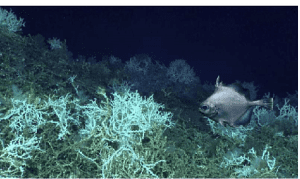TAG: GS 3: ECOLOGY AND ENVIRONMENT
THE CONTEXT: In a recent discovery, scientists have unveiled the existence of the largest deep-sea coral reef off the U.S. Atlantic coast.
EXPLANATION:
- The revelation came after decades of awareness about the presence of some coral in the region, with the actual extent remaining elusive until recent advancements in underwater mapping technology.

Mapping the Enigmatic Reef:
- The discovery was facilitated by cutting-edge underwater mapping technology, enabling the creation of detailed 3D images of the ocean floor.
- According to an oceanographer at the nonprofit Ocean Exploration Trust, the colossal deep coral reef was “right under our noses, waiting to be discovered.”
- The findings, published in the journal Geomatics, shed light on a coral reef stretching approximately 310 miles (499 kilometers) from Florida to South Carolina, with a width reaching 68 miles (109 kilometers) at certain points.
- The total area encompasses nearly three times the size of Yellowstone National Park.
Scale and Depth:
- The awe-inspiring dimensions of the deep-sea reef are not only extensive but also reach impressive depths, ranging from 655 feet to 3,280 feet (200 meters to 1,000 meters).
- Unlike tropical coral reefs that thrive on photosynthesis due to sunlight penetration, these deep-sea corals survive by filtering food particles from the water for energy.
Ecological Importance:
- Deep coral reefs play a crucial role in providing habitat for a diverse array of marine life, including sharks, swordfish, sea stars, octopus, shrimp, and various other fish species.
- The significance of these ecosystems lies in their ability to sustain life in the absence of sunlight, showcasing the resilience and adaptability of marine organisms.
Comparison with Tropical Reefs:
- While tropical reefs, such as the renowned Great Barrier Reef in Australia, are more familiar to scientists and the general public due to accessibility, the newly discovered deep-sea reef dwarfs them in scale.
- The Great Barrier Reef, stretching about 1,430 miles (2,301 kilometers), is overshadowed by the vastness of the Atlantic deep-sea coral reef.
Conservation Concerns:
- The revelation prompts speculation about the possibility of uncovering even larger deep-sea reefs in the future, considering that only approximately 75% of the world’s ocean floor has been mapped in high-resolution.
- Moreover, a mere 50% of U.S. offshore waters have undergone comprehensive mapping.
- The study underscores the urgency of conservation efforts as both deep-sea and tropical reefs face similar risks, including climate change impacts and disturbances from activities such as oil and gas drilling.
Conclusion:
- The discovery of this colossal deep-sea coral reef not only expands our understanding of marine ecosystems but also emphasizes the importance of continued exploration and conservation.
- As technology advances, further revelations about the hidden wonders of the ocean floor are anticipated, providing valuable insights for sustainable management and protection of these vital underwater ecosystems.
SOURCE: https://phys.org/news/2024-01-largest-deep-sea-coral-reef.html
Spread the Word

